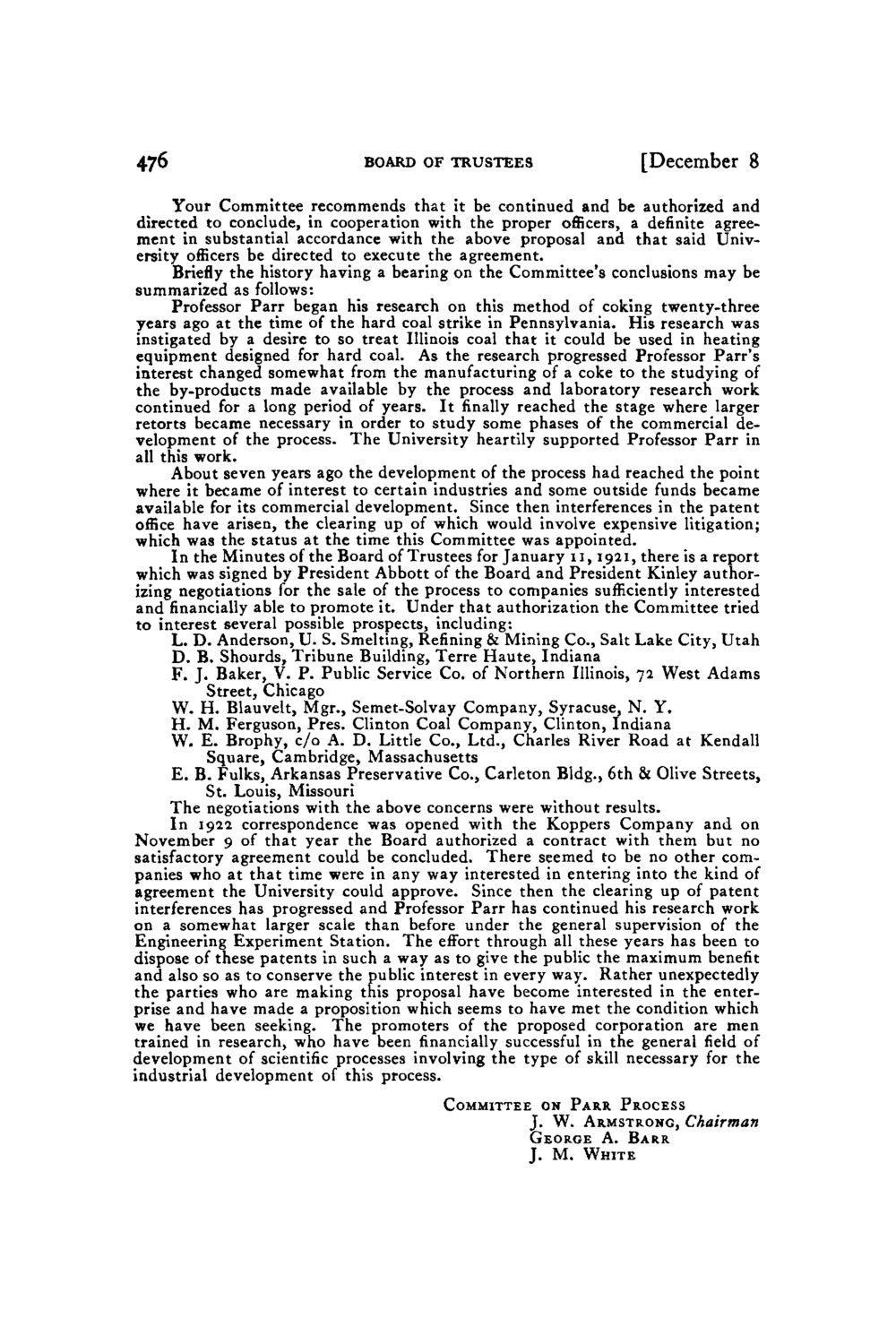| |
| |
Caption: Board of Trustees Minutes - 1926
This is a reduced-resolution page image for fast online browsing.

EXTRACTED TEXT FROM PAGE:
476 board of trustees [December 8 Your Committee recommends that it be continued and be authorized and directed to conclude, in cooperation with the proper officers, a definite agreement in substantial accordance with the above proposal and that said University officers be directed to execute the agreement. Briefly the history having a bearing on the Committee's conclusions m a y be summarized as follows: Professor Parr began his research on this method of coking twenty-three years ago at the time of the hard coal strike in Pennsylvania. His research was instigated by a desire to so treat Illinois coal that it could be used in heating equipment designed for hard coal. A s the research progressed Professor Parr's interest changed somewhat from the manufacturing of a coke to the studying of the by-products made available by the process and laboratory research work continued for a long period of years. Itfinallyreached the stage where larger retorts became necessary in order to study some phases of the commercial development of the process. The University heartily supported Professor Parr in all this work. About seven years ago the development of the process had reached the point where it became of interest to certain industries and some outside funds became available for its commercial development. Since then interferences in the patent office have arisen, the clearing up of which would involve expensive litigation; which was the status at the time this Committee was appointed. In the Minutes of the Board of Trustees for January n , 1921, there is a report which was signed by President Abbott of the Board and President Kinley authorizing negotiations for the sale of the process to companies sufficiently interested andfinanciallyable to promote it. Under that authorization the Committee tried to interest several possible prospects, including: L. D. Anderson, U. S. Smelting, Refining & Mining Co., Salt Lake City, Utah D. B. Shourds, Tribune Building, Terre Haute, Indiana F. J. Baker, V. P. Public Service Co. of Northern Illinois, 72 West A d a m s Street, Chicago W . H . Blauvelt, Mgr., Semet-Solvay Company, Syracuse, N . Y . H . M . Ferguson, Pres. Clinton Coal Company, Clinton, Indiana W . E. Brophy, c/o A. D. Little Co., Ltd., Charles River Road at Kendall Square, Cambridge, Massachusetts E. B. Fulks, Arkansas Preservative Co., Carleton Bldg., 6th & Olive Streets, St. Louis, Missouri The negotiations with the above concerns were without results. In 1922 correspondence was opened with the Koppers C o m p a n y and on November 9 of that year the Board authorized a contract with them but no satisfactory agreement could be concluded. There seemed to be no other companies w h o at that time were in any way interested in entering into the kind of agreement the University could approve. Since then the clearing up of patent interferences has progressed and Professor Parr has continued his research work on a somewhat larger scale than before under the general supervision of the Engineering Experiment Station. The effort through all these years has been to dispose of these patents in such a way as to give the public the m a x i m u m benefit and also so as to conserve the public interest in every way. Rather unexpectedly the parties w h o are making this proposal have become interested in the enterprise and have made a proposition which seems to have met the condition which we have been seeking. The promoters of the proposed corporation are m e n trained in research, w h o have beenfinanciallysuccessful in the generalfieldof development of scientific processes involving the type of skill necessary for the industrial development of this process. Committee on Parr Process J. M. WhiteBarr Chairman George A. W. Armstrong,
| |